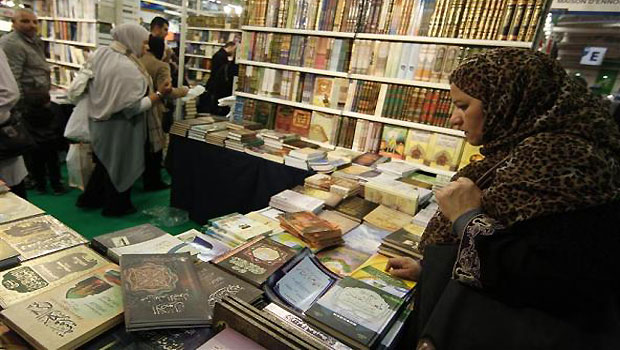
A woman looks at books inside an exhibition hall during the 29th annual meeting of French Muslims organized by The Union of Islamic Organizations of France (UOIF) at Le Bourget, near Paris April 7, 2012. (Reuters/Gonzalo Fuentes)
“First, we have to define the concept of readership in France. In this country, any writer whose novel sells more than 10,000 copies is considered lucky. The number of writers whose books sell more than 10,000 are many, and some of whom are Arabs. But there are two sides to the publishing industry in this country: books written in French, and those translated into it.
“As for Arab novels originally written in French, we have to differentiate between, first, the second and third-generation immigrant writers whose books are viewed as being as French as books written by [ethnically] French authors. Second are the Francophone authors who come from different Arab countries, such as the Maghreb, Lebanon, Egypt and even from Saudi Arabia. These writers’ novels are often labeled as ‘Francophone’ rather than ‘French’ literature, in a gesture that implies negative discrimination.
“As for Arabic novels translated into French, these are labeled as translated world literature.
“On investigation, the two types of Arabic novel suffer from a shortage in readership despite the fact that there are a number of accomplished Arab novelists whose books are popular in France, such as Tahar Ben Jelloun, Amin Maalouf, Naguib Mahfouz, and Alaa Al-Aswany, among others.
“In fact, both Ben Jelloun and Maalouf write in French and have been awarded the Prix Goncourt, France’s most important literary award, which boosted their book sales and pushed French and Francophone readers to rediscover their bibliographies. As for Mahfouz, the Nobel Prize encouraged the French to discover this giant of Arabic novel. The case of Alaa Al-Aswany remains unique. This widely-read novelist managed to invade the French market, thanks to the movie adaptation of his The Yacoubian Building, which was screened in France. Ironically, Aswany even exceeded his compatriot, the late Albert Cossery, who wrote in French.
“These four novelists are not the only ones who represent Arabic literature in one way or another. In fact, France has recently witnessed an upsurge in the popularity of Algerian writers, represented by Yasmina Khadra and Boualem Sansal, among others. The work of these two writers enjoys widespread popularity in France, and at least two of Khadra’s works have been adapted into movies, such as The Attack and The Swallows of Kabul.
“French readers are not homogenous and the kind of readership depends on the nature of the novel. Perhaps Ben Jelloun’s folklore-like novels appeal to ordinary readers. Amin Maalouf’s informed view of the East appeals to other readers. Novels by Abdellah Taia and Rachid O, which tackle issues of homosexuality, appeal to those who view the East as a sources of temptation, harems, taboos and other hushed-up topics.
“Politics is present in the works of Yasmina Khadra [a pseudonym of the Algerian Mohammed Moulessehoul], who wrote about the Arab–Israeli conflict, Afghanistan and more.
“In fact, the film adaptation of Khadra’s The Attack has sparked debate after the Lebanese director, Zead Dweiri, filmed parts of it in Tel-Aviv, a thing which will play into the hands of the author as far as sales of his books are concerned.”
This is the second part of our series on Arabic novel in the West. The first part can be read here. The third part will be published tomorrow.
